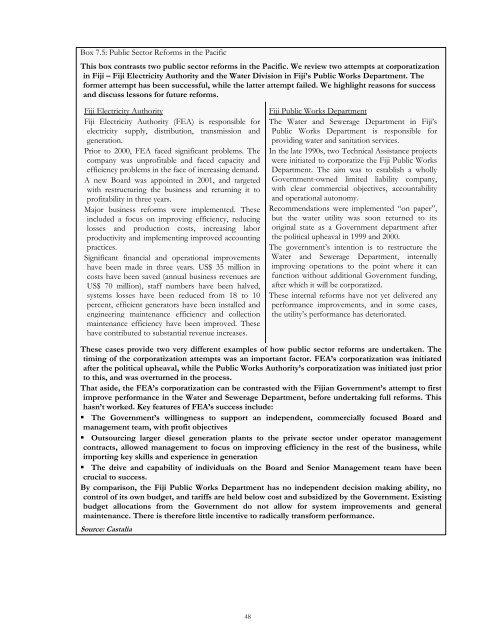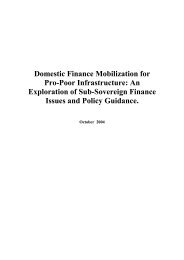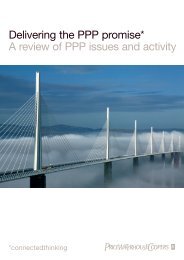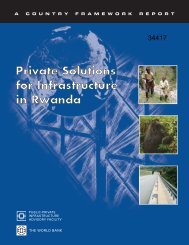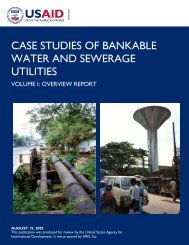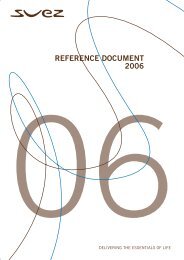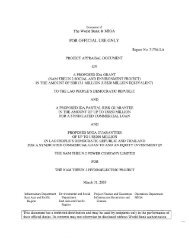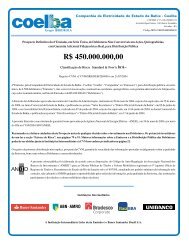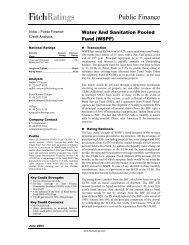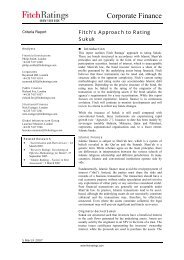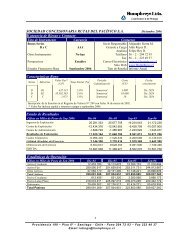EAP - The Pacific Infrastructure Challenge - World Bank (2006).pdf
EAP - The Pacific Infrastructure Challenge - World Bank (2006).pdf
EAP - The Pacific Infrastructure Challenge - World Bank (2006).pdf
You also want an ePaper? Increase the reach of your titles
YUMPU automatically turns print PDFs into web optimized ePapers that Google loves.
Box 7.5: Public Sector Reforms in the <strong>Pacific</strong><br />
This box contrasts two public sector reforms in the <strong>Pacific</strong>. We review two attempts at corporatization<br />
in Fiji – Fiji Electricity Authority and the Water Division in Fiji’s Public Works Department. <strong>The</strong><br />
former attempt has been successful, while the latter attempt failed. We highlight reasons for success<br />
and discuss lessons for future reforms.<br />
Fiji Electricity Authority<br />
Fiji Electricity Authority (FEA) is responsible for<br />
electricity supply, distribution, transmission and<br />
generation.<br />
Prior to 2000, FEA faced significant problems. <strong>The</strong><br />
company was unprofitable and faced capacity and<br />
efficiency problems in the face of increasing demand.<br />
A new Board was appointed in 2001, and targeted<br />
with restructuring the business and returning it to<br />
profitability in three years.<br />
Major business reforms were implemented. <strong>The</strong>se<br />
included a focus on improving efficiency, reducing<br />
losses and production costs, increasing labor<br />
productivity and implementing improved accounting<br />
practices.<br />
Significant financial and operational improvements<br />
have been made in three years. US$ 35 million in<br />
costs have been saved (annual business revenues are<br />
US$ 70 million), staff numbers have been halved,<br />
systems losses have been reduced from 18 to 10<br />
percent, efficient generators have been installed and<br />
engineering maintenance efficiency and collection<br />
maintenance efficiency have been improved. <strong>The</strong>se<br />
have contributed to substantial revenue increases.<br />
Fiji Public Works Department<br />
<strong>The</strong> Water and Sewerage Department in Fiji’s<br />
Public Works Department is responsible for<br />
providing water and sanitation services.<br />
In the late 1990s, two Technical Assistance projects<br />
were initiated to corporatize the Fiji Public Works<br />
Department. <strong>The</strong> aim was to establish a wholly<br />
Government-owned limited liability company,<br />
with clear commercial objectives, accountability<br />
and operational autonomy.<br />
Recommendations were implemented “on paper”,<br />
but the water utility was soon returned to its<br />
original state as a Government department after<br />
the political upheaval in 1999 and 2000.<br />
<strong>The</strong> government’s intention is to restructure the<br />
Water and Sewerage Department, internally<br />
improving operations to the point where it can<br />
function without additional Government funding,<br />
after which it will be corporatized.<br />
<strong>The</strong>se internal reforms have not yet delivered any<br />
performance improvements, and in some cases,<br />
the utility’s performance has deteriorated.<br />
<strong>The</strong>se cases provide two very different examples of how public sector reforms are undertaken. <strong>The</strong><br />
timing of the corporatization attempts was an important factor. FEA’s corporatization was initiated<br />
after the political upheaval, while the Public Works Authority’s corporatization was initiated just prior<br />
to this, and was overturned in the process.<br />
That aside, the FEA’s corporatization can be contrasted with the Fijian Government’s attempt to first<br />
improve performance in the Water and Sewerage Department, before undertaking full reforms. This<br />
hasn’t worked. Key features of FEA’s success include:<br />
<strong>The</strong> Government’s willingness to support an independent, commercially focused Board and<br />
management team, with profit objectives<br />
Outsourcing larger diesel generation plants to the private sector under operator management<br />
contracts, allowed management to focus on improving efficiency in the rest of the business, while<br />
importing key skills and experience in generation<br />
<strong>The</strong> drive and capability of individuals on the Board and Senior Management team have been<br />
crucial to success.<br />
By comparison, the Fiji Public Works Department has no independent decision making ability, no<br />
control of its own budget, and tariffs are held below cost and subsidized by the Government. Existing<br />
budget allocations from the Government do not allow for system improvements and general<br />
maintenance. <strong>The</strong>re is therefore little incentive to radically transform performance.<br />
Source: Castalia<br />
48


